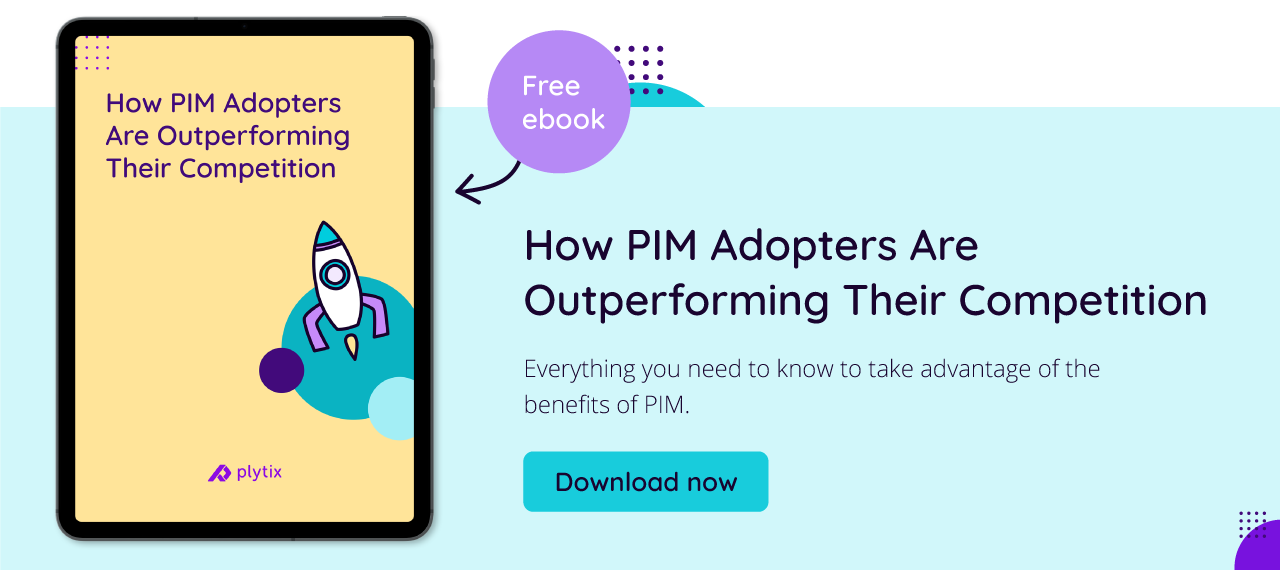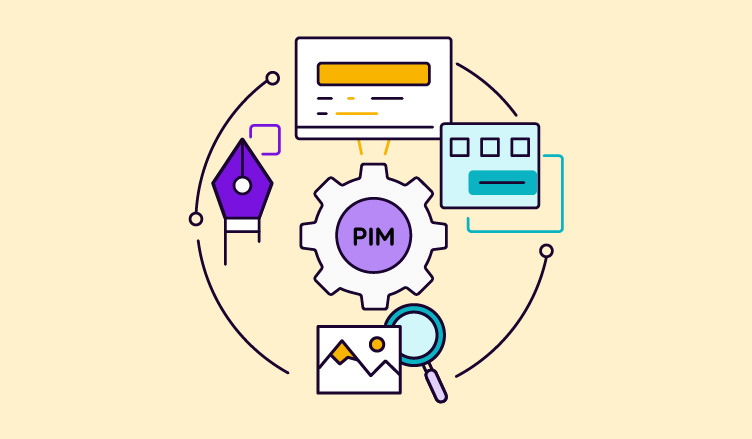If you’re working in distribution and wholesale, I am so sorry for your data woes. First, you have to deal with receiving product information in various formats from your manufacturers and suppliers. Next, you have to sort through it all and check everything for completeness and accuracy. As if that wasn’t enough, you then have to deal with each of your retailers and resellers’ particular data requirements before you can send it on. It’s like you’re between a rock and a hard place—if the rock was sending you incomplete data and the hard place had very specific data entry requirements.
To help make the situation more bearable, more and more distribution and wholesale companies are implementing specialized software into their organizations. In particular, Product Information Management or PIM software can be a massive help for handling all the data flowing in and out of your company—read on to learn how and why.
What is PIM software for distributors and wholesalers?
PIM software is essentially a centralized system that allows businesses to manage all their product information in one place. It’s crucial for checking data accuracy, making sure your product data is complete and up-to-date, and preparing information for distribution across multiple channels using advanced automation features.
For those in the distribution and wholesale sectors, PIM software offers a central hub where data from multiple manufacturers can be easily collected, adapted, and then sent out to retailers, other distributors, or whoever else needs it.

Features of PIM software for distribution and wholesale companies
PIM software combines a massive range of useful features that have been designed with distribution and wholesale businesses in mind—here are some of the key functionalities that make PIM systems so indispensable in this industry.

This includes details like descriptions, specifications, pricing, and inventory levels. By centralizing this data, it becomes easier to manage, update, and maintain consistency across your organization.
Advanced data importing: The process of getting all that information into the system is straightforward too, since this software has capabilities to handle various data formats from your different sources.
Many PIM tools can also automate the process of importing data into the system as well, using things like URL feeds, FTP/SFTP, and Dropbox connections.

Automated completeness trackers let you see what percentage of the relevant information has been completed for any given product, and even use that attribute as the filter for the next feature…
Smart lists: These are lists of your products that are automatically generated by the PIM tool based on criteria that you set, so that could be all the relevant products for a particular retailer, or just the products that do or don’t have all their vital information filled in.
The best part about these lists is that they continue updating themselves over time, so every time a new product gets added to your catalog, or something changes in your data, the lists will automatically reflect those changes too.

It gives companies a structured way to store and monitor all the necessary data, including translations and adjusted versions of marketing material for local market conditions.
Retailer-specific content: On a related note, PIM systems are also built to help you adapt your data in countless other ways for countless other reasons. A particular benefit for distributors is the software’s ability to adjust prices for different retailers and resellers, depending on the conditions that have been agreed upon and/or any discounts in place.
Automated data transformation: The tool can actually tailor your content at the moment of export without affecting the original “master” attribute in your system.
This means you can have one price in your system that gets adjusted for each of your retailers whenever you send them information, without having to store multiple versions of the same price in your tool.
Advanced multimedia adapting: Similarly, PIM tools have features for resizing and reformatting images on export too. This feature means you can avoid filling your system with unnecessary duplicates if different retailers want images in different formats. You can also link images, videos, and any other relevant files to specific products to make organization much easier.
Export options: PIM software gives you various options for sharing your data with the rest of the world.
These range from the ability to download your information as a CSV, PDF, or XLSX file, to hosting a URL feed to give retail partners access whenever they need it, to generating online catalogs of your products that update themselves in real time.
Key wholesale and distribution data handled by PIM software
There’s a wide range of data that can be stored in PIM software. When it comes to data points relevant for distributors and wholesalers, these are the most relevant:
🔍 Product identifiers
- SKUs, GTINs, UPCs, and other reference numbers/codes: These are essential for uniquely identifying products in the distribution chain.
- Organizational data: Attributes such as brand, manufacturer, or supplier names help sort and organize products efficiently.
- Taxonomy data: This includes categories, subcategories, and related products, which are vital for creating structured product catalogs.
📋 Product details
- Specifications: Detailed information about product dimensions, materials, technical data, and any other relevant data.
- Labels and titles: Naming conventions that help in easy identification and searching of products.
🖼️ Digital assets
- Marketing multimedia: Product images and videos, so that customers can see the products before they buy.
- Branding content: Some manufacturers/brands will have specific visual content that they require to be displayed everywhere their products are sold.
- Technical documents: Warranties, instruction manuals, terms and conditions, and any other important documents associated with your products.
🔐 Regulatory and compliance data
- Local and international standards: Everything necessary to make sure products meet diverse regulatory requirements, which is critical for global distribution.
🤑 Financial data
- Cost and pricing: Information regarding the cost of goods from suppliers and the pricing strategies for different markets.
- Promotions and discounts: Management of varying pricing structures and promotional offers across different customer segments.
What are the benefits of PIM software for distribution and wholesale?
Now that we’ve seen what PIM software does and what data it can handle, there’s one big question left—why? Here’s a list of the top benefits of PIM software for distribution and wholesale companies.
More efficient operations
By centralizing product information, PIM software makes operations across various departments throughout your organization way more efficient and optimized. The centralization aspect reduces time spent searching for product data, allowing teams to focus on more strategic (and less mind-numbing) tasks.
Faster time-to-market
With all product information readily available and easily manageable, PIM software turbocharges the process of getting products to market. This rapid availability is crucial in industries where speed and efficiency are directly correlated with success (a.k.a. most of them).
Improved data security and compliance
PIM systems power up your data security by allowing detailed control over who can access or edit specific data. On top of that, they help businesses stay compliant with international standards by making it far easier to manage relevant documentation and certification processes.
 Increased customer satisfaction
Increased customer satisfaction
By providing accurate and complete product information, PIM software helps your customers make informed purchasing decisions, leading to higher satisfaction and loyalty and fewer costly returns.
Real-life case study: Plytix PIM and Musco Food
Musco Food, a legacy food company established in 1926 by a Sicilian family in Maspeth, has evolved from a local deli in Little Italy to a major distributor of fine foods from over 200 brands across Europe and Australia. Initially serving the Italian American community with imported Italian specialties, the company has shifted from retail to focus solely on importing and distributing a broad range of products. Today, Musco Food serves a wide range of retailers, including small family-owned stores and large grocers across major cities from Boston to Philadelphia.
As the company expanded, managing product data became increasingly complex, particularly when their product portfolio reached around 1700 active items. The need for up-to-date and accurate product sheets became a pressing challenge for sales reps. When Sabina Belser joined as Head of Marketing in 2018, she prioritized implementing a Product Information Management system that was affordable and effective, selecting Plytix for its DAM capabilities, sleek design, and user-friendly interface.
“It was a no-brainer to invest in a solution that could help me manage and distribute content,” says Sabina. This tool has given sales reps the ability to easily update and share product information, significantly reducing the need for constantly revising product sheets.
The implementation of PIM software has been transformative for Musco Food, particularly during the COVID-19 pandemic, as it facilitated a seamless transition to online retail for many of their clients. The centralized data repository has not only powered more efficient in-store and ecommerce displays but has also allowed the company to expand its portfolio and improve operational efficiency overall. This strategic use of technology has positioned Musco Food as a stronger partner in the retail sector, supporting their clients' shifts to ecommerce and simplifying internal processes so they can focus on growth and new opportunities.
Maximizing business potential with PIM
For distribution and wholesale businesses, adopting PIM software can make all the difference. It’s an indispensable tool for any commerce company aiming to optimize their product data management, streamline their operations, and generally improve their market responsiveness. If you’re ready to explore how PIM can revolutionize your business, dive deeper with the ebook linked below—and consider a consultation with a PIM expert to see if you can tailor the software to your specific needs.
Frequently Asked Questions
PIM stands for Product Information Management. It refers to software that helps businesses manage all of their product information in one centralized system. This software is particularly useful in industries like distribution and wholesale where large amounts of product data are handled.
Imagine a tool that gathers all your scattered product data, organizes it beautifully, and then serves it up perfectly tailored to each of your retailer's needs—that's what a PIM does. It collects information from various sources, checks its accuracy and completeness, and then speeds up or automates the distribution of this information across multiple channels and platforms. With PIM, data chaos turns into organized efficiency.
Anyone who deals with a lot of product information can benefit from using PIM software, but it’s especially crucial for those in distribution and wholesale. This includes companies that need to manage extensive product ranges and guarantee that accurate, up-to-date information is consistently delivered to retailers, resellers, and ecommerce platforms.
Within your organization, many different departments can make use of the software– read more about who uses PIM here.
Companies need PIM to manage their product information efficiently. This software helps simplify the management of product data, reduce errors, and save time.
By using PIM, companies can improve their operational efficiency, increase customer satisfaction with accurate product information, and achieve faster product launches. This is critical in competitive markets where timely and accurate information delivery is key to business success.







